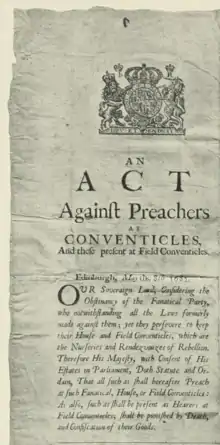Alexander Dunbar
Alexander Dunbar was a Covenanting field preacher and school teacher.[1] He was imprisoned on the Bass Rock for about a year between 1685 and 1686.[2]
Alexander Dunbar | |
|---|---|
| Personal | |
| Religion | Christianity |
| School | Presbyterianism |
.jpg.webp)
Early life
.jpg.webp)
.jpg.webp)
.jpg.webp)

Alexander Dunbar was born about 1645, the same year as the Battle of Auldearn. He was probably son of John Dunbar, minister of Edinkillie.[4] He graduated from King's College, Aberdeen, with an M.A. in 1661. He was a school master at Auldearn from 1666 to 1670. He became chaplain and tutor at Kilravock.[5]
Ministry
Having completed his student curriculum, he was licensed by a few of the “outed ministers,” at Edinburgh, in 1682. He was ordained before 13 July 1678. Immediately, after being licensed, he began preaching which he assiduously carried on until the beginning of 1685, when he was apprehended. The indictment, which was a somewhat serious one, charged him with “keeping conventicles, withdrawing from the ordinances, inculcating seditious doctrine, plotting against the Government, supplying and harbouring rebels, and other public crimes and irregularities.” When examined before a Committee of the Privy Council, at Elgin, in the beginning of the year 1685, he admitted that he had not attended the Parish Kirk and had officiated several times in private houses. He also refused to take the oath of allegiance to King James.[6] Dunbar was, therefore, sentenced to penal servitude amid the plantations of the West being banished by the Privy Council 2 March 1685. His transportation, however, never was carried into effect. In lieu thereof, he was conveyed a prisoner to the Bass, in February 1685, where he remained one full year, after which he regained his liberty on the ground of the impaired state of his health.[7][8]
After the toleration
On 6 July 1687 he was acknowledged by the Presbyterian ministers of Lothian at their first meeting after the Toleration. He was admitted to Auldern in 1689. Dunbar was a member of Assembly in the years 1690 and 1692. He died after an illness of three years, on 29 October 1707. Macdonald said his life and ministry in Auldearn were in thorough consistency with the testimony which he bore for the truth in imprisonment and in bonds. Sir Hugh Campbell of Cawdor refers to him in his book on the Lord's Prayer, as "the holy Mr Alexander Dunbar, minister of Auldearn."[9] He left 200 merks to provide silver communion cups for the parish.[10]
Family
He married (1) Margaret Meldrum, who died 29 September 1689 and (2) Beatrix Fowler, who survived him.
Bibliography
- Wodrow s Hist., iv., 196
- Moray Tests.
- Brodie's Diary.
References
- MacDonald, Murdoch (1875). The Covenanters in Moray and Ross. Edinburgh: Maclaren & Macniven. pp. 141-153. Retrieved 23 February 2019.
- Dickson, John (1899). Emeralds chased in Gold; or, the Islands of the Forth: their story, ancient and modern. [With illustrations.]. Edinburgh and London: Oliphant, Anderson & Ferrier. pp. 209–210. Retrieved 3 March 2019.
 This article incorporates text from this source, which is in the public domain.
This article incorporates text from this source, which is in the public domain. - Hewison, James King (1908). The Covenanters, a history of the church in Scotland from the Reformation to the Revolution. 2. Glasgow: J. Smith. pp. 413-454. Retrieved 16 July 2019.CS1 maint: ref=harv (link)
- "Edinkillie Parish Church". CANMORE. Royal Commission on the Ancient and Historical Monuments of Scotland. Retrieved 2019-03-16.
- Bain, George (1893). History of Nairnshire. Nairn: Nairn Telegraph Office. pp. 282-289. Retrieved 16 March 2019.
- The register of the Privy Council of Scotland EDITED AND ABRIDGED BY HENRY PATON, M.A., WITH AN INTRODUCTION BY ROBERT KERR HANNAY, LL.D., FRASEIR PROFESSOR OF SCOTTISH HISTORY AND PALAEOGRAPHY IN THE UNIVERSITY OF EDINBURGH (THIRD SERIES. VOL. X. A.D. 1684-1685. ed.). Edinburgh: H.M. General Register House. 1927. p. 473. Retrieved 9 March 2019.
- Porteous, James Moir (1881). The Scottish Patmos. A standing testimony to patriotic Christian devotion. Paisley: J. and R. Parlane. p. 74. Retrieved 3 March 2019.
- M'Crie, Thomas, D.D. the younger (1847). The Bass rock: Its civil and ecclesiastic history. Edinburgh: J. Greig & Son. pp. 373–374. Retrieved 11 February 2019.
- MacDonald, Murdoch (1875). The Covenanters in Moray and Ross. Edinburgh: Maclaren & Macniven. p. 192. Retrieved 23 February 2019.
 This article incorporates text from this source, which is in the public domain.
This article incorporates text from this source, which is in the public domain. - Scott, Hew (1926). Fasti ecclesiæ scoticanæ; the succession of ministers in the Church of Scotland from the reformation (New Edition, Volume 6 ed.). Edinburgh : Oliver and Boyd. pp. 436–437. Retrieved 9 March 2019.
 This article incorporates text from this source, which is in the public domain.
This article incorporates text from this source, which is in the public domain.
